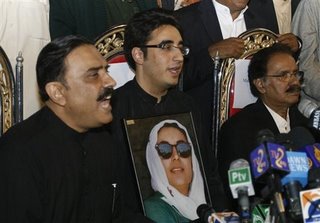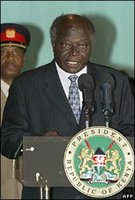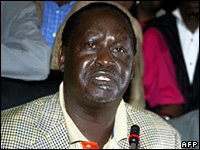 Asif Ali Zardari (left), the widower of the slain former Pakistani Prime Minister Benazir Bhutto, and Amin Fahim, president of the Pakistan People’s Party (PPP), which Bhutto headed before she was assassinated on Thursday, held a news conference yesterday to announce that Bhutto’s 19-year-old son, Bilawal Zardari (center), has been named to succeed her as party leader.
Asif Ali Zardari (left), the widower of the slain former Pakistani Prime Minister Benazir Bhutto, and Amin Fahim, president of the Pakistan People’s Party (PPP), which Bhutto headed before she was assassinated on Thursday, held a news conference yesterday to announce that Bhutto’s 19-year-old son, Bilawal Zardari (center), has been named to succeed her as party leader.
This, of course, will extend the Bhutto dynasty that began when her father – Pakistan’s first elected prime minister – founded the PPP in 1967.
“I stand committed to the principle of federation . . . . My mother always said, `democracy is the best revenge’.“ [Bilawal “Bhutto” Zadari, who has co-opted his mother’s name “to honor her memory” and make himself more politically appealing]
However, according to Fahim, Bhutto named her husband to succeed her in her will, and that it was he who then nominated their son to lead the party, which would appear to contradict Bhutto’s public declaration that she did not want her children to get involved in politics.
At any rate, it appears father and son will serve as co-chairmen. And they claim to be fully prepared to contest next month’s parliamentary elections. Moreover, they appealed to the party of former prime minister Nawaz Sharif to reverse its decision to boycott the elections. And reports are that Sharif has agreed.
But here’s the rub: neither Bhutto’s son nor her widower is eligible to participate in the election. Not that either one of them would have been interested even if he were eligible.
After all, Bilawal has made it clear that he intends to return to England (ASAP) to continue his studies at Oxford University. Never mind that this seems a backwards decision given that no textbook or lecture could prepare him to lead Pakistan nearly as well as being tutored and mentored (on the job) by PPP party elders in Pakistan.
Although, it hardly seems fair to expect him to forego the years of character building – borne of youthful indiscretions – that await him at university. After all, this is the rite of passage for every young adult.
Meanwhile, despite his firebrand political rhetoric, Asif Ali seems positively averse to succeeding his wife, as a martyr-in-waiting for her cause. Moreover, he has made it clear that he’s quite happy to have party president Fahim serve as prime minister if the PPP wins, while he continues living the good life in Dubai (on the billions many Pakistanis suspect he embezzled by skimming off “10 percent commissions on government contracts” during his wife’s two terms as prime minister).
But am I the only one who finds it ironical, if not hypocritical, that Bhutto, who purportedly embodied the best hope for democracy in Pakistan, bequeathed leadership of the PPP to her husband, who immediately declared that their son will take over whenever it suits his fancy . . . ? Evidently nepotism, not democracy, is the best revenge …..
Kenya Given the international media focus on Bhutto’s assassination, you can be forgiven for having no clue that Kenya held hotly contested national elections on that same fateful day last Thursday. But reports are that the re-election of the 76-year-old incumbent president, Mwai Kibaki, was achieved by “vote rigging and foul play” that were egregious even by African standards.
Given the international media focus on Bhutto’s assassination, you can be forgiven for having no clue that Kenya held hotly contested national elections on that same fateful day last Thursday. But reports are that the re-election of the 76-year-old incumbent president, Mwai Kibaki, was achieved by “vote rigging and foul play” that were egregious even by African standards.
Yet there was such widespread dissatisfaction with his party’s leadership that, despite this alleged corruption, 23 of Kibaki’s 32 cabinet members, including his vice president, lost their parliamentary seats – according to the latest count. This, of course, would tend to lend credence to allegations that his presidential results were fraudulent.
“We believe that . . . the ECK [Electoral Commission of Kenya] . . . has not succeeded in establishing the credibility of the tallying process to the satisfaction of all parties and candidates.” [Chief EU observer Alexander Lambsdorff] Meanwhile, Opposition leader Raila Odinga rejected the ECK’s results, and his party has announced that it will hold an alternative ceremony today to inaugurate him as the duly elected president. This, notwithstanding the fact that Kibaki was sworn in yesterday, and is already trying desperately to form a new cabinet.
Meanwhile, Opposition leader Raila Odinga rejected the ECK’s results, and his party has announced that it will hold an alternative ceremony today to inaugurate him as the duly elected president. This, notwithstanding the fact that Kibaki was sworn in yesterday, and is already trying desperately to form a new cabinet.
 “There is a clique of people around Kibaki trying to rob Kenyans of the election.” [Raila Opposition leader Odinga]
“There is a clique of people around Kibaki trying to rob Kenyans of the election.” [Raila Opposition leader Odinga]
Alas, this sets up the all-too-familiar prospect of Africans resorting to tribal warfare to settle their political disputes.
Indeed, as soon as Kibaki was declared the winner, clashes broke out between members of Kibaki’s Kikuyu tribe and those of Odinga’s Luo tribe. And those of us who are still hoping against hope for a political awakening in Africa could not help but look on in despair as Kenya, the beacon of democracy on the continent, descended back into the heart of darkness – where bloodlust gives rise to Idi Amins and Rwandan genocides….
NOTE: Adding an international dimension to this spectacle, Kenya’s former colonial masters in England have sided with Odinga; while its current political benefactors in America have already congratulated Kibaki on his re-election.
Pakistan Bhutto assassinated, Kenya elections
Mario says
Nothing hypocritical about Bhutto bequeathing leadership to her husband/son. Certainly it’s nepotism, but it seems rather consistent at least with American political strategy, i.e. Bush/Clinton political rule for the last 20 (and potentially more) years. So if American is supposedly leading democracy in the world by example (the true irony), Bhutto is following tradition.
Both current events (in Pakistan, Kenya), however, make me very weary of the potential influence outside interest may have had on recent outcomes. The turmoil in Kenya particularly saddens me. It’s odd that England and the United States, two allies, would side opposite one another on the Kenyan election. Or do the current leaders of US/UK governments view it in their mutual interest to foster divide around the world?